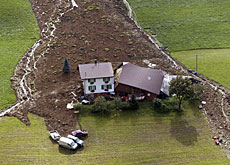Selling science without selling out

What can scientists do when uncertainty and variability make it difficult to convince decision makers and the public of the need to tackle climate change?
The Swiss office of the British Council has been inviting young academics from around the world to Switzerland to show them how to sell their science without losing their integrity.
As swissinfo learned during a visit to the latest workshop, the task is anything but easy.
“What decision makers want is a yes-no or black and white answer that scientists are trained not to give,” explained Franz Andres Morrissey, a lecturer at Bern University’s English department.
Morrissey told the scientists to take a new approach by putting more emphasis on results and less on methodology.
“In most cases a lay audience – to which decision makers belong – is not worried about the methodology. They are basically worried about what is reasonably certain as a result, and to what degree this result is supported.”
The British Council’s Sripriya Sitaraman, responsible for organising this year’s workshop focusing on climate change and public health, said the need to improve communication skills was brought home in Al Gore’s Oscar-winning film, An Inconvenient Truth.
In the film, Gore claims a peer-reviewed survey of nearly 1,000 scientific articles over the past ten years found that not one text questioned the severity of global warming or the role played by humans. But a similar survey of the popular press found more than half of the published reports doubted the science of climate change.
“There seems to be some sort of breakdown somewhere, and one way to address that is to enable the scientists to communicate what they know in a clearer way than they have so far,” Sitaraman says.
But Mark New, a climate scientist specialising in water issues at Oxford University, was uncomfortable with the workshop emphasis on simplification. He justified the need to present detailed information, including all of the uncertainties and variability.
Arctic ice
New said it was not the job of scientists, but personalities like Al Gore and environmental organisations, to present worst-case scenarios.
“I’d be far more comfortable with the World Wildlife Fund saying there’s a real risk that Arctic sea ice will have completely disappeared in 20 years time, than me saying that. Because there is a risk, but the most likely outcome is that there will be Arctic sea ice in 20 years’ time,” he added.
“If we make a value judgement and say something extreme to get attention there is a lot of scope for climate deniers to undermine that.”
It is a problem Chinese scientists have yet to deal with, since they are still to a great extent denied opportunities to speak out publicly by their government.
“We have to do research on issues the government thinks important, and we are not allowed to talk about serious problems in public,” says Xuefeng Cui, whose work includes an investigation on how land use changes in Tibet affect the local and global climate.
Public health
Many of the workshop participants were medical specialists, interested in what the climate scientists had to say in order to judge the effect rising temperatures could have on public health. But they aren’t always prepared to make the link between global warming and people’s health.
Nicole Bender, a doctor at Bern University’s Institute for Social and Preventive Medicine, defended for example the Swiss scientific community’s decision in 2003 not to make more of a direct link between that summer’s heatwave, which killed about 1,000 people in the country, and climate change, even if it would have given climate science greater visibility.
“The problem is we cannot say for sure what will happen [in future] and how strong [the impact] will be, so we have to keep to the facts,” Bender argued.
Still, she thinks scientists at her university could improve their communication skills.
Her colleague, Anke Huss, gave a good example of how the language chosen by scientists can make or break their case when speaking in the public domain.
“Part of our science is about mobile phones and health. It’s a large issue in Switzerland at the moment. If you use a mobile phone for a long period of time, will you have an increased risk of brain tumours?”
What Huss avoided saying at the outset – and scaring off her audience – is that she is a specialist in electromagnetic fields.
swissinfo, Dale Bechtel in Grosshöchstetten
Since 2004, the British Council has been working together with Swiss institutions by holding workshops on a variety of themes connected with climate change.
Invited are young scientists from Switzerland, Britain, but also many other countries. The latest three-day workshop focusing on climate change and public health also involved researchers from Canada, Bangladesh, Portugal, Finland and China.
A key element of the workshop is communication training.

In compliance with the JTI standards
More: SWI swissinfo.ch certified by the Journalism Trust Initiative












You can find an overview of ongoing debates with our journalists here . Please join us!
If you want to start a conversation about a topic raised in this article or want to report factual errors, email us at english@swissinfo.ch.